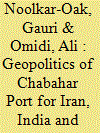| Srl | Item |
| 1 |
ID:
183176


|
|
|
|
|
| Summary/Abstract |
In January 2016, Iran, India and Afghanistan signed a trilateral economic agreement on developing the Chabahar Port in south-eastern Iran. This project holds immense economic and geopolitical value for both Iran and India. Chabahar, as Iran’s first deep water port, connects it to oceanic trade routes. This helps Iran to mitigate US sanctions and sustain trade relations with neighbours and independent states such as India. For India, Chabahar is the key point of the ‘International North–South Transport Corridor’, an ambitious project connecting India to Central Asia and Europe. The article analyses the geostrategic, economic and trade-related importance of Chabahar port from both Iranian and Indian perspectives. This Iranian–Indian trade co-operation is considered a strategic alternative, if not a rival, to the Belt and Road Initiative (BRI) and the China–Pakistan Economic Corridor (CPEC), whose key point is the Gwadar port in Pakistan, next door to Chabahar.
|
|
|
|
|
|
|
|
|
|
|
|
|
|
|
|
| 2 |
ID:
093601


|
|
|
|
|
| Publication |
2010.
|
| Summary/Abstract |
Classical-liberal arguments about the pacifying effects of international trade are revisited, and it is argued that they consistently refer to the ability of trade to provide 'connections' between people and to create a perceived 'global community'. Dependency and openness are commonly used to test for any pacifying effects of trade in the current literature, but these measures fail to capture some of the classical liberals' key insights. Several network measures are introduced in order to give natural expression to and to develop the classical-liberal view that trade linkages reduce interstate conflict. These measures applied to trade flows are incorporated in the Russett & Oneal triangulating-peace model. The main results are that trade networks are indeed pacifying in that both direct and indirect trade linkages matter, and as the global trade network has become more dense over time, the importance of indirect links by way of specific third countries has declined, and the general embeddedness of state dyads in the trade network has become more relevant. These findings suggest that the period since World War II has seen progressive realization of the classical-liberal ideal of a security community of trading states.
|
|
|
|
|
|
|
|
|
|
|
|
|
|
|
|